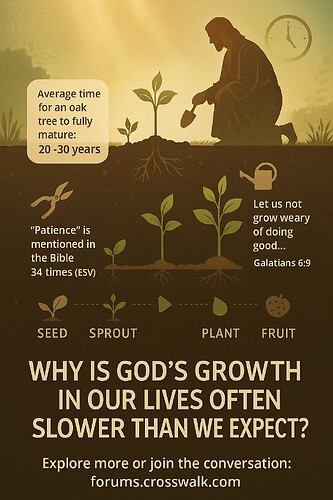Why Is God’s Growth in Our Lives Often Slower Than We Expect?
If God is all-powerful, why does His work in our hearts sometimes feel like it’s moving at a snail’s pace?
#SpiritualGrowth #GodsTiming #FaithAndPatience #christianforums #crosswalkforums #forums #crosswalk #faithcommunity #faithforums
We’ve all been there—praying for change, longing for spiritual maturity, waiting for God to work in a specific area of our lives. And yet… days, months, or even years go by, and the progress feels painfully slow.
The Bible speaks of God as the Master Gardener, planting seeds of truth, pruning away what’s unhealthy, and cultivating growth. But gardens don’t flourish overnight. They require seasons of waiting, unseen root work, and conditions that don’t always make sense to us in the moment.
Still, the waiting can be frustrating.
Why does God allow growth to happen in such gradual steps?
If He could transform us instantly, why choose the slow process?
Is it because the journey is shaping us in ways the destination can’t?
Or does our pace of growth say more about us than about Him?
And what do we do in those seasons when we feel “stuck”—praying for breakthrough, but only seeing small, barely noticeable changes?
Is slow growth a sign that something’s wrong… or proof that something deeper is happening beneath the surface?
“All things take time to grow—especially the things God wants to last forever.”
Read more here:

